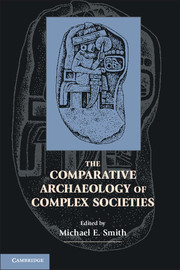Book contents
- Frontmatter
- Contents
- Tables
- Figures
- Contributors
- Foreword
- Preface
- Chapter 1 Comparative Archaeology
- Chapter 2 Approaches to Comparative Analysis in Archaeology
- Chapter 3 Comparative Frames for the Diachronic Analysis of Complex Societies
- Chapter 4 What It Takes to Get Complex
- Chapter 5 Challenges for Comparative Study of Early Complex Societies
- Chapter 6 Patterned Variation in Regional Trajectories of Community Growth
- Chapter 7 The Genesis of Monuments in Island Societies
- Chapter 8 Power and Legitimation
- Chapter 9 The Strategies of Provincials in Empires
- Chapter 10 Household Economies under the Aztec and Inka Empires
- Chapter 11 Low-Density, Agrarian-Based Urbanism
- Chapter 12 Archaeology, Early Complex Societies, and Comparative Social Science History
- Index
- References
Chapter 3 - Comparative Frames for the Diachronic Analysis of Complex Societies
Next Steps
Published online by Cambridge University Press: 07 October 2011
- Frontmatter
- Contents
- Tables
- Figures
- Contributors
- Foreword
- Preface
- Chapter 1 Comparative Archaeology
- Chapter 2 Approaches to Comparative Analysis in Archaeology
- Chapter 3 Comparative Frames for the Diachronic Analysis of Complex Societies
- Chapter 4 What It Takes to Get Complex
- Chapter 5 Challenges for Comparative Study of Early Complex Societies
- Chapter 6 Patterned Variation in Regional Trajectories of Community Growth
- Chapter 7 The Genesis of Monuments in Island Societies
- Chapter 8 Power and Legitimation
- Chapter 9 The Strategies of Provincials in Empires
- Chapter 10 Household Economies under the Aztec and Inka Empires
- Chapter 11 Low-Density, Agrarian-Based Urbanism
- Chapter 12 Archaeology, Early Complex Societies, and Comparative Social Science History
- Index
- References
Summary
The top scientific discovery according to the journal Science in 2007 (Kennedy 2007) was the finding that the DNA of all humans is not alike. More specifically, the extent of person-to-person genomic diversity is much greater than was expected (Pennisi 2007). To place this breakthrough in context, it was less than ten years ago that the same publication proudly announced the unraveling of “The Human Genome” (Jasny and Kennedy 2001), although in fairness the future comparison of different human genomic sequences was anticipated. What geneticists initially conceived to be a species-wide genomic pattern encompassing relatively minimal elements of individual variation has even at this early date been shown to be more diverse than most scientists imagined.
Although these research findings in evolutionary biology have been played out at warp speed, perhaps this path of discovery and interpretation has a degree of analogical utility for those of us who study human societies over long temporal scales or deep history. More than a century ago, early social scientists recognized broad patterns of human societal diversity (e.g., Morgan 1877). Yet the first recognitions of such diversity were often mistakenly commingled with elements of human biology. More than a half century later, similar overarching schemes of human organization were resurrected and reframed as Marxist and neoevolutionary theoretical perspectives. But by this time (e.g., White 1959), these ideas were appropriately estranged from the simple biological explanations of prior eras. Nevertheless, the latter conceptual approaches, like those of an earlier era, stressed broad modes of societal diversity (such as Service’s [1971] categories of bands, tribes, chiefdoms, states) that were organized and differentiated by distinct degrees of politico-economic complexity. As with the 2001 early genomic work, the emphasis in these studies was understandably on the broad-brush modal patterns. Thus key works of this era featured titles such as The Evolution of Culture (White 1959), Primitive Social Organization (Service 1971), The Evolution of Political Society (Fried 1967), and The Evolution of the Prehistoric State (Haas 1982). The focus of this comparative work was on similarity, and much discussion centered on evaluating the relative merits of different prime movers that might uniformly account for the transition to more hierarchical modes of organization (such as the state) in different regions of the globe.
- Type
- Chapter
- Information
- The Comparative Archaeology of Complex Societies , pp. 21 - 43Publisher: Cambridge University PressPrint publication year: 2011
References
- 4
- Cited by



